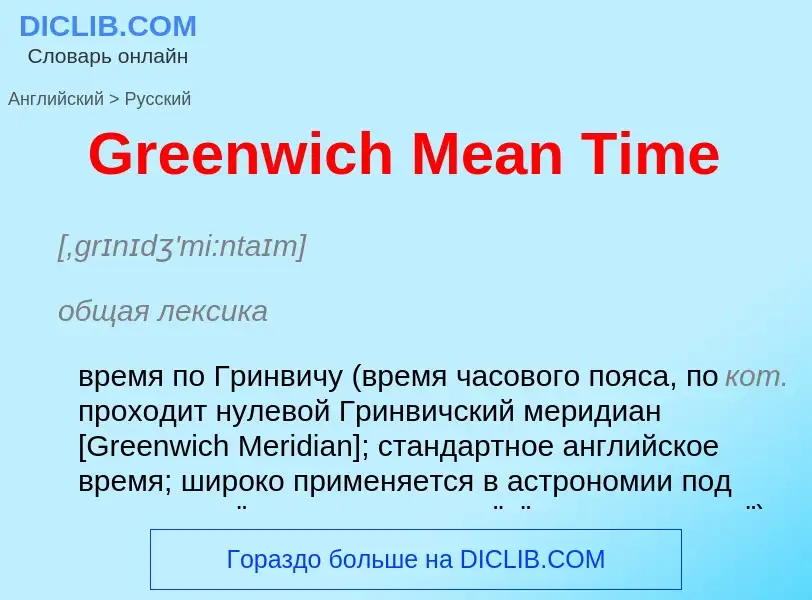Μετάφραση και ανάλυση λέξεων από την τεχνητή νοημοσύνη ChatGPT
Σε αυτήν τη σελίδα μπορείτε να λάβετε μια λεπτομερή ανάλυση μιας λέξης ή μιας φράσης, η οποία δημιουργήθηκε χρησιμοποιώντας το ChatGPT, την καλύτερη τεχνολογία τεχνητής νοημοσύνης μέχρι σήμερα:
- πώς χρησιμοποιείται η λέξη
- συχνότητα χρήσης
- χρησιμοποιείται πιο συχνά στον προφορικό ή γραπτό λόγο
- επιλογές μετάφρασης λέξεων
- παραδείγματα χρήσης (πολλές φράσεις με μετάφραση)
- ετυμολογία
G M T Greenwich mean time - translation to Αγγλικά
[,grɪnɪdʒ'mi:ntaɪm]
общая лексика
время по Гринвичу (время часового пояса, по кот. проходит нулевой Гринвичский меридиан [Greenwich Meridian]; стандартное английское время; широко применяется в астрономии под названием "всемирное время", "мировое время")
[,dʒi:,em'ti:]
общая лексика
Greenwich Mean Time
среднее время по Гринвичу (по гринвичскому меридиану)
теперь используется термин Universal Time (UT)
Ορισμός
Βικιπαίδεια
Greenwich Mean Time (GMT) is the mean solar time at the Royal Observatory in Greenwich, London, counted from midnight. At different times in the past, it has been calculated in different ways, including being calculated from noon; as a consequence, it cannot be used to specify a particular time unless a context is given. The term 'GMT' is also used as one of the names for the time zone UTC+00:00 and, in UK law, is the basis for civil time in the United Kingdom.
English speakers often use GMT as a synonym for Coordinated Universal Time (UTC). For navigation, it is considered equivalent to UT1 (the modern form of mean solar time at 0° longitude); but this meaning can differ from UTC by up to 0.9 s. The term GMT should thus not be used for purposes that require precision.
Because of Earth's uneven angular velocity in its elliptical orbit and its axial tilt, noon (12:00:00) GMT is rarely the exact moment the Sun crosses the Greenwich Meridian and reaches its highest point in the sky there. This event may occur up to 16 minutes before or after noon GMT, a discrepancy described by the equation of time. Noon GMT is the annual average (the arithmetic mean) moment of this event, which accounts for the word "mean" in "Greenwich Mean Time".
Originally, astronomers considered a GMT day to start at noon, while for almost everyone else it started at midnight. To avoid confusion, the name Universal Time was introduced to denote GMT as counted from midnight. Today, Universal Time usually refers to UTC or UT1.
The term "GMT" is especially used by United Kingdom bodies, such as the BBC World Service, the Royal Navy, and the Met Office; and others particularly in Arab countries, such as the Middle East Broadcasting Centre and OSN.

![Clock in [[Kumasi]], [[Ghana]], set to GMT. Clock in [[Kumasi]], [[Ghana]], set to GMT.](https://commons.wikimedia.org/wiki/Special:FilePath/Donald Stewart's Monument- Kumasi.jpg?width=200)
